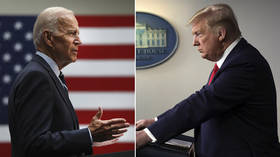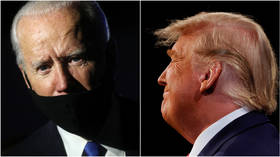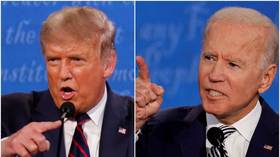Slavoj Zizek: Biden’s just Trump with a human face, and the two of them share the same enemy

The threat of violence erupting over the US election result next week is exposing the limits of liberal democracy, and both candidates’ rejection of left-wing ‘extremists’ is liberal opportunism at its worst.
In the run up to the US presidential elections, different forms of populist resistance are gradually forming a unified field: “Armed militia groups are forging alliances in the final stages of the US presidential election with conspiracy theorists and anti-vaxxers who claim the coronavirus pandemic is a hoax, intensifying concerns that trouble could be brewing ahead of the election day. Leading advocates of anti-government and anti-science propaganda came together at the weekend, joined by the founder of one of the largest militia groups.”
Three dimensions are at work here: conspiracy-theories (like QAnon), Covid-deniers, and violent militias. These are often inconsistent and relatively independent: there are conspiracy theorists who don’t deny the reality of the epidemic, but see in it a (Chinese) plot to destroy the US; there can be Covid-deniers who don’t see a conspiracy behind the epidemic, but just deny the seriousness of the threat (such as the Italian philosopher Giorgio Agamben), etc.
But the three dimensions are now moving together: violent militias legitimize themselves as the defenders of freedom, which they see as threatened by a deep state conspiracy against the reelection of Trump, with the pandemic as a key element of this plot; if Trump loses reelection, it will be the result of this intrigue, which means that violent resistance to Trump’s loss is legitimate.
In October 2020, the FBI revealed that a right-wing militia group planned to kidnap Gov. Gretchen Whitmer of Michigan and take her to a secure location in Wisconsin. There, she would undergo a kind of people’s “trial” for her “treason” for imposing tough restrictions to curb Covid infections and thereby, according to the militia group, violating the freedoms guaranteed by the US Constitution.
Does this plan not recall the most famous political kidnapping in Europe? In 1978, Aldo Moro, a key figure of the Italian political establishment who evoked the possibility of the big coalition between Christian Democrats and Communists, was kidnapped by the Red Brigades, put to a trial by a people’s court and shot dead.
Angela Nagle, the academic and writer, was right here also: the new populist Right is adopting methods that were decades ago clearly identified as belonging to extreme Left “terrorist” groups. This, of course, in no way implies that the two “extremes” somehow coincide: we don’t have a stable center symmetrically flanked by two extremes.
The basic antagonism is the one between the establishment and the Left, and the rightist violent “extremism” is a panicky reaction triggered when the center is threatened. This became clear in the last presidential debate when Trump accused Biden of backing “Medicare for all,” saying “Biden agreed with Sanders”; Biden replied: “I beat Bernie Sanders.” The message of this reply was clear: Biden is Trump with a human face, in spite of their opposition they share the same enemy. This is liberal opportunism at its worst: renounce the Left “extremists” out of the fear of not scaring the center.
Also on rt.com United (Socialist) States of America? Trump-Biden showdown is a battle for the capitalist soul of the countryTrump plays an ambiguous game here – when he is asked about radical rightist groups which propagate violence or conspiracy theories, he seeks to formally distantiate himself from these problematic aspects while praising the group’s general patriotic attitude. This distancing is empty, of course, a purely rhetorical device: the group is silently expected to act upon the implicit calls to violence Trump’s speeches are full of. When Trump attacks alleged leftist violence, he does it in terms that are divisive and a call to violence. Exemplary is Trump’s answer when he was asked about the violence propagated and practiced by the Proud Boys group:
“Within minutes after US President Donald Trump told the Proud Boys, a far-right group with members who espouse white supremacism, to ‘stand back and stand by’, on national television on Sept. 29, 2020, members of the men-only group took to fringe social media sites to celebrate what they considered a ‘historic’ moment for their ideological push against leftists.”
This is (if I can be pardoned for using this problematic expression) Trump at his best: he does tell them to stand back, i.e., to restrain from violence, but he adds “and stand by,” i.e., get ready – to do what? The implication is clear and unambiguous: be ready to practice violence if Trump loses the election. Even if the danger of an actual civil war exploding in the US is probably vacuous, the very fact that this possibility is widely talked about is significant.
And it’s not just the US that is moving in this direction: take a look at the stories in Europe’s media; in Poland, liberal public figures complain that they are becoming spectators at the dismantling of democracy; the same is happening in Hungary.
At an even more general level, a certain tension which is immanent to the very notion of parliamentary democracy is gaining visibility today. Democracy means two things: the “power of the people” (the substantial will of the majority should express itself in the state), and trust in the electoral mechanism: no matter how many manipulations and lies there are, once the numbers are counted the result is to be accepted by all sides.
This is what happened when Al Gore conceded defeat to Bush in the 2000 US election, although more people voted for him and the counting in Florida was very problematic – the public’s trust in the formal procedure is what gives parliamentary democracy its stability. Problems arise when these two dimensions get out of sync, and both the Left and the Right demand that the people’s substantial will should prevail over electoral formalities. And in some sense they are right: the mechanism of democratic representation is not really neutral, as the eminent French philosopher Alain Badiou has written:
“If democracy is a representation, it first of all represents the general system which sustains its form. In other words, the electoral democracy is only representative insofar as it is first the consensual representation of capitalism, which is today renamed ‘market economy.’”
One should take these lines in the strictest formal sense: at the empirical level, of course, the multi-party liberal democracy “represents” – mirrors, registers, measures – the quantitative dispersal of different opinions of the people, what they think about the proposed programs of the parties and about their candidates, etc.. However, prior to this empirical level and in a much more radical sense, the very form of multi-party liberal democracy “represents” – instantiates – a certain vision of society, politics, and the role of the individuals in it – politics is organized in parties which compete through elections to exert control over the state legislative and executive apparatus, etc. One should always be aware that this frame is never neutral, it privileges certain values and practices.
Also on rt.com No matter who wins the US election, expect more sabre-rattling. The only question is when and where the next conflict will beginThis non-neutrality becomes palpable in moments of crisis or indifference, when we experience the inability of the democratic system to register what people effectively want or think – this inability is signaled by anomalous phenomena like the UK elections of 2005: in spite of the growing unpopularity of Tony Blair (he was regularly voted the most unpopular person in the country), there was no way for this discontent with Blair to find a politically effective expression. Something was obviously very wrong here – it was not that people “did not know what they wanted,” but, rather, that cynical resignation prevented them from acting upon it, so that the result was the weird gap between what people thought and how they acted (voted).
A year or so ago, a similar gap exploded more brutally with the rise of the gilets jaunes, or yellow vests, in France: they clearly articulated an anger that it was impossible to translate or transpose into the terms of the politics of institutional representation. Which is why the moment Macron invited their representatives to a dialogue and challenged them to formulate their complaints in a clear political program, their protest evaporated. Exactly the same thing happened with Podemos in Spain: the moment they agreed to play party politics and enter the government, they became almost indistinguishable from the Socialists – yet another sign that representative democracy doesn’t fully work.
In short, the crisis of liberal democracy has lasted for more than a decade, and the Covid epidemic has only made it worse. The solution to this is certainly not to be found in some kind of more “true” democracy that will be more inclusive of all minorities – the very frame of liberal democracy will have to be left behind, which is exactly what liberals fear most. The path to true change opens only when we lose hope of change within the system. If this appears to be too “radical,” recall that today, our capitalist system is already changing, although in the opposite sense.
Direct violence is as a rule not revolutionary, but conservative, a reaction to the threat of a more basic change: when a system is in a crisis, it begins to break its own rules. Hannah Arendt, the political philosopher, said, violent outbreaks are, in general, not the cause that change a society, but rather the birth pains of a new society in a society that has already expired due to its own contradictions.
Let’s remember that Arendt said this in her polemic against Mao, who himself believed that “power grows out of the barrel of a gun” – Arendt qualifies this like an “entirely non-Marxist” conviction and claims that, for Marx, violent outbursts are like “the labor pangs that precede, but of course do not cause, the event of organic birth.” Basically, I agree with her, but I would add that there never will be a fully peaceful “democratic” transfer of power without the “birth pangs” of violence: there will always be moments of tension when the rules of democratic dialogue and changes are suspended.
Today, however, the agent of this tension is the Right, which is why, paradoxically, the task of the Left is now, as the US politician Alexandria Ocasio-Cortez has pointed out, to save our “bourgeois” democracy when the liberal center is too weak and indecisive to do it. Is this in contradiction with the fact that the Left today should move beyond parliamentary democracy?
No: as Trump demonstrates, the contradiction is in this democratic form itself, so that the only way to save what is worth saving in liberal democracy is to move beyond it – and vice versa, when rightist violence is on the rise, the only way to move beyond liberal democracy is to be more faithful to it than the liberal democrats themselves. This is what the successful democratic return to power of the Morales’s party in Bolivia, one of the few bright spots in our devastated landscape, clearly signals.
Think your friends would be interested? Share this story!
The statements, views and opinions expressed in this column are solely those of the author and do not necessarily represent those of RT.

















